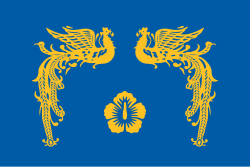This article needs additional citations for verification .(May 2025) |
- Top left: Rhee Syng-man was the first president.
- Top right: Park Chung Hee was the longest-serving president.
- Bottom left: Park Geun Hye was the first female president.
- Bottom right: Lee Jae Myung is the current president.
The president of the Republic of Korea serves as the chief executive of the government of the Republic of Korea and the commander-in-chief of the Republic of Korea Armed Forces.
Contents
The South Korean government constitutionally considers the Korean Provisional Government (KPG) to be its predecessor. [1] The KPG was established in 1919 as a government in exile in Shanghai during the Japanese occupation of Korea. It had nine different heads of state between September 1919 and August 1948.
Under the 1988 Constitution of the Sixth Republic of Korea, the presidential term is set at five years with no re-election. The president must be a South Korean citizen, at least 40 years old, who has lived in South Korea for 5 years. [2] The term was previously set at four years during the First Republic from 1948 to 1960, including a two-term limit that was repealed in 1954. The presidency was changed into a ceremonial role elected by legislators to five-year terms during the Second Republic from 1960 to 1963. The Third Republic returned the presidency to a directly-elected position with a four-year term in 1963 and repealed the two-term limit in 1969. Under the Yushin Constitution of the Fourth Republic adopted in 1972, the presidency became an indirectly elected position with six-year terms and no limits to re-election. It was replaced with a seven-year term under the Fifth Republic in 1981, which retained the indirect elections but prohibited a second term. [3]
As of 2025 [update] , fourteen people have served in full capacity as president of South Korea [4] since the office was formally established on 24 July 1948, when Rhee Syng-man took office after being elected by the Constituent National Assembly. [3] The longest-serving president is Park Chung Hee, who held the office for nearly 16 years from 1963 until his assassination in 1979 following a period of authoritarian rule. [3] [5] The first and only woman to hold the presidency was his daughter Park Geun-hye, who was elected in 2012 and removed from office in 2017 after her impeachment was upheld by the Constitutional Court of Korea. [3] [6]
Lee Jae Myung assumed office on 4 June 2025 following the impeachment of his elected predecessor, Yoon Suk Yeol, by the National Assembly on 14 December 2024 after his martial law declaration. His powers were suspended until his impeachment was upheld by the Constitutional Court on 4 April 2025, which formally ended Yoon's presidency. Lee was elected in the 2025 presidential election. [7]































